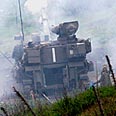
Exchanges of fire in north
צילום: אביהו שפירא
Hizbullah clash victory for pullout
Sunday's exchanges of fire with Hizbullah justified Lebanon withdrawal
The Israeli press was united in reporting that Sunday's IDF clash with Hizbullah was an unqualified victory for Israel. According to these reports, Hizbullah was surprised by the ferocity of Israel's response, and stopped shooting first.
This success is attributed to the IDF's excellent preparations for battle and the determination of Israeli politicians.
The information behind these reports, of course, was provided by the IDF itself. The Israeli media has no sources inside Hizbullah, and so it remains completely dependent on the information provided by military spokesmen. These people do their work honestly and faithfully, but naturally tend to see things from a perspective that is convenient for them.
But even if we take what they say at face value and don't question their ability to judge the goings-on north of the border, Sunday's events should be judged in light of the withdrawal from Lebanon, the sixth anniversary of which falls later this week.
Stern warnings
To remind: The highest echelons of the IDF were staunchly opposed to the withdrawal. Spokespeople warned the public and decision makers alike that Hizbullah would chase us deep into Israeli territory, and Israel's ability to respond to attacks would be limited.
As soon as we give up the security zone, went the argument, the entire Galilee region would burn. Some even warned of an inevitable clash with Syria.
But what do you know, Israel's withdrawal to the international border allowed the army to respond strongly when attacked. Syria's occupation of Lebanon lost its legitimacy,
From the international border, it turns out Israel has much greater justification for using force to defend itself, and for demanding the Lebanese government take responsibility for the goings-on in that country.
General lessons
The lesson, of course, is even more general: The worldview of military men and women is necessarily limited. They are honest professionals, but they are also given to view questions of security through the prism of the tools at their discretion.
And secondly, abandoning the idea of security zones, of pushing borders away from settlements at a cost of unstable and immoral territorial occupations, allows for the increased, more effective use of force.
Even on a tactical-military level, the situation got better for Israel after the pullout. As long as the IDF was in Lebanon, Hizbullah was truly a guerilla organization: It drew legitimacy and support from those who opposed the occupation, and its fighters were peddlers by day and soldiers by night. It was difficult to work out which supportive civilians were actually activists.
Since the pullout, there have been growing voices in Lebanon demanding Hizbullah disarm, and at the same time the organization has more permanent – and therefore attackable – buildings. Six years ago, even if the IDF had wanted to attack Hizbullah outposts, it wouldn't have had so many targets.
Applied history
Not everything that happens in Lebanon is a lesson to be applied in other arenas, but the principles are similar. We would do well to remember them when those amongst us warn about the dangers of future withdrawals, and when they present our various enemies in apocalyptic colors, as if they are irrational villains who lack the ability to change course.
Those who claim that the IDF won Sunday's battle must honestly admit why we failed to win during all that time in Lebanon, prior to May, 2000.










